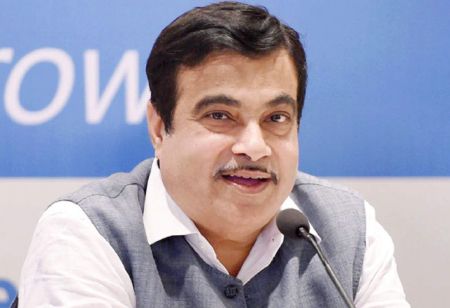
Nitin Gadkari: Becoming the Highwayman of India


Believing roads to be the key to prosperity can be easily proved through the accomplishments of the Highwayman of India, Nitin Gadkari, Minister of Road Transport & Highways, Government of India. His visionary leadership reflects the speed of transformations and changing perception of India, which was previously thought to be a nation that was poor at infrastructure development. His ambitions don’t stop there; the Highwayman, Nitin Gadkari, has planned more monumental developments for the nation. Now, filmmakers are capturing Nitin Gadkari’s biography in an effort to depict how he does it all.
The BJP was clear in its thoughts on economic development activities after springing back to power in 2014, ready to invest the spending on road infrastructure and transportation. Then, the duty of bringing Vajpayee's spirit and reforming the nation’s transportation system was passed on the shoulders of Gadkari. In valor, Gadkari soon became one of the most effective and productive BJP ministers who broke records in highway construction and introduced EV-friendly infrastructure.
How He Did It
After he assumed the office of the Union Ministry of Road Transport and Highways (MoRTH) in 2014, Gadkari displayed a never-before-seen speed in developing infrastructures in India. In fact, statistics show that in India, road transportation accounts for 87 percent of passenger traffic and over 60 percent of freight movement. However, 92,851 km of the 48.85 lakh km that made up the nation's network in 2013–14 were national highways and expressways. This expanded to 63.32 lakh km overall by 2022–2023, with over 1.45 lakh km of national highways.
Gadkari has championed many infrastructure projects as the Minister of Road Transport and Highways, focused on building ports, highways, and waterways.
His innovative approach is what is seen to be widely observed in India's transportation system which underwent a significant transformation, along with his focus on efficiency and the extensive use of technology.
He has been hell-bent on lowering traffic accidents and raising road safety as well. Clearly, his actions have not only prevented fatalities but also raised the standard of transportation in the nation as a whole.
As for his goals, they revolve around embracing alternate fuels, encouraging electric and hybrid cars, and promoting sustainability—plus he is a strong supporter of enhancing waterways and has been instrumental in bringing back inland water transportation in India. Gadkari has gained acclaim for his aggressive and practical approach to the development of India's infrastructure and his dedication to sustainable growth.
He has received recognition for his unwavering commitment to improving road safety and lowering traffic accidents, which has made him a pivotal role in India's infrastructure development. Gadkari is regarded as a visionary leader in the field of transportation and infrastructure development because of his persistent dedication to modernization, sustainability, and advancement.
In the 2020–21 fiscal year, India built 13,394 km of highways, notwithstanding the COVID. Nitin Gadkari told the media that the speed of highway construction had reached a record 37 km/day, a significant new milestone, compared to 16.5 km/day prior to his taking over the Ministry. The length of National Highways has expanded by 50 percent under the BJP government, from 91,287 km in April 2014 to 1,37,625 km as of March 20, 2021. The Ministry of Road Transport & Highways has authorized the designation of over 53,031 km of national highways, according to a PIB announcement.
The Role of Technology
Union Minister Nitin Gadkari emphasized the importance of cutting-edge technology in all fields to guarantee the nation's rapid economic progress, highlighting the part that students play in reaching this objective.
He also insisted that research should be goal-oriented and thoroughly market-analyzed before beginning any project. He was addressing attendees at a special convocation of Assam Downtown University, where the honorary D. Litt. degree was awarded to the union road transport and highways minister in appreciation of his work towards the North East region's infrastructure development.
He placed a strong emphasis on research that guarantees products generate value and benefit the economy in a variety of ways.
His Future Focus
India is a country that is continuously developing, and as its infrastructure and standard of living rise, so does the traffic issue. Highway projects are being implemented on a regular basis nationwide to alleviate traffic. In a recent event, Union Transport and Highway Minister Nitin Gadkari laid the foundation stones of highway projects worth over Rs 2,500 crore, hence accelerating Jharkhand's growth through the construction of modern infrastructure.
The building of the Bero to Khunti stretch will improve the development of the neighboring areas and reduce traffic.
Notably, projects like the Huliyar-KB cross-Chunchanahalli-Nelligere road are meant to improve the connection between North Karnataka and Mysuru.
In keeping with the goal of simplified urban design, a significant bridge over the Lakshmanathirtha River is being built in Hunsur Town to relieve traffic. Furthermore, the goal of the construction of the Chintamani and Srinivasapura bypasses is to lessen traffic in both cities. A deliberate attempt to enable unimpeded traffic circulation is highlighted by the placement of Road over Bridges (ROBs) on railway-level crossings in addition to large and smaller bridges.
During the PHD Chamber of Commerce and Industry (PHDCCI) summit, Gadkari discussed the role of bioenergy for Atmanirbhar Bharat in energy security and mitigating climate change. He suggested a strategic change from importing fuel, which accounts for 85 percent of the fuel and is valued at approximately 16 lakh crores, to exporting fuel. Gadkari emphasized the possibility of producing ethanol from surplus commodities like sugarcane and broken rice, which would eliminate the government's requirement to buy these goods at MSPs. Gadkari promoted sustainable aviation fuel and expressed hope about the substantial investment potential in bio-aviation fuel in India, with an objective of building a 2 lakh crore economy. He also emphasized the significance of policy diversification.